Prigozhin and Dugina as Heroes of the Sacred Struggle
Two lives, two symbols, one Heavenly Russia
Alexander Dugin examines how a single gesture by Prigozhin came to embody the drama of Russia’s present.
Russia is rich in its heroes. Among those names is Yevgeny Prigozhin. Yes, a paradoxical hero, yet astonishing in his magnitude and stature, his contradictions, his falls and rises. That is an indisputable fact. Here is why…
In the Gospel, there are the words of Jesus Christ Himself: “But he that shall endure unto the end, the same shall be saved” (Matthew 24:13). The Orthodox tradition is very ancient and wise and points out that a person is always exposed to temptations, struggles, and constant dangers while he remains on this earth.
Therefore saints are never glorified during their lifetime. Even if they lead a holy life, we do not know how they will finish their earthly path. We do not know what their posthumous fate will be. A person is free and at any moment can turn away from God, from truth, and from the right path. He lives with this freedom from birth to death. And in this freedom he can choose evil. One small turn and everything will go to ruin.
A hero is free as well. We call a person a hero only when he has achieved a transformation. For example, only when Heracles already lies upon the funeral pyre and ascends to Olympus can we say that he was a true hero — one who conquered not only death but life itself, who conquered time and rose above it.
Therefore it is incorrect to compare dead heroes with those who are still living. Simply because the dead can no longer betray. However, it is also incorrect to compare dead heroes with one another. We know what they were; we see it. Yet to say that this one is more of a hero and that one is less, as with saints — “less saintly” or “more saintly” — is unwise. So let us not evaluate our heroes that way.
Yevgeny Prigozhin is a hero. We know this because Prigozhin is no more. He was subjected to trials; very great forces contended for his soul and his decisions: the forces of Russian history and the forces of the invisible world.
The writer Alexander Prokhanov, who dedicated his latest novel Lemner to Prigozhin, believes that Prigozhin stopped on the road to Moscow of his own free will. The angel in him overcame the demon. Although both were undoubtedly very strong. But precisely this makes him a hero, and an astonishing one at that. In scale, scope, drama, contradictions, falls, and rises, he truly represents a very large personality. He is not merely a hero but a great hero.
In every person, there is a struggle between the angelic, the divine, and the demonic principles. But heroes differ in that this struggle is visible in them. Others can observe it, draw conclusions, and base their own heroic steps on those conclusions.
Therefore, in my view, Prigozhin in this case represents an incomprehensible and unattainable level for the present day. I think he is such a hero because, seeing his demonic component, our leadership will probably be cautious about granting free rein to similarly passionate personalities. Yet that is another extreme. Balance is important. But Prigozhin’s scale is unique.
A Challenge for a Generation
In our time, there are individuals who have distinguished themselves through exceptional service to the Motherland. For example, my daughter Dasha [Daria]. The whole people remember her, and when I enter various churches and ask the pastors to commemorate her, they say: “We have been doing that all the time, all these years.” Because Dasha was something greater than an ordinary patriot who suffered at the hands of Ukrainian terrorists. She is among the victims of a terrorist state. She is one of our people of the word, our people of truth.
Undoubtedly, many war correspondents performed feats and risked themselves on the front line more than Dasha did. Yes, she was in the Donetsk People’s Republic (DPR) and faced the same risks as everyone who has lived in Donbass since 2014. But she is remembered because she was young, beautiful, and, most importantly, because she was incredibly alive. Life simply bursts forth in her interviews, her speeches, and her books. We collected materials, selecting the most important of her deep thoughts, into five substantial volumes. And on the memorial to Dasha, erected not far from the place of her death, she is depicted together with a book.
Of course, monuments should be erected to all our heroes, collective and individual. But Dasha remains a special hero. A hero with a book — a thinking girl, a brave girl, braver than many men. She is a challenge for a generation. For young men, she is an incentive to protect people like her, to prevent the enemy from killing them with impunity. For girls, she is an example of how to become carriers of our Russian pure spirit, intelligence, culture, openness, activity, and vitality.
“Not Just a Historical Moment”
In this sacred war, many people from the Eurasian Youth Union also died. For example, Pavel Kanishev, leader of the Eurasian Youth Union. He fell during an assault; he was an assaulter during the liberation of Constantinople. Imagine: the territory of the DPR, occupied by the enemy, and the settlement is called the same as Constantinople, Tsargrad.
For us Eurasianists, this is not just a historical moment but the highest shrine; this is our whole teaching. And a person who for many years defended these ideas turns out to be not merely an intellectual, a teacher, a public figure, but goes and dies for his idea precisely at Constantinople, the symbol of our sacred war.
However, when we speak of these heroes, it does not mean we should not also speak about others. About Dagestanis, Chechens, Buryats, Tuvans, about our other great Russian warriors who gave their lives for our Victory. Each of them is priceless, each unique, each one of a kind. And that is very important.
Nevertheless, there are figures who are very substantive and multidimensional. Even if they were not always consistent in their struggle, they were truly bearers of high and deep meanings — often problematic, often ambiguous, often paradoxical.
But that is life. Life is the struggle of the divine principle with the demonic. In those people in whom this struggle is evident — where divine fidelity, courage, and love for the Motherland, the Church, and the spirit triumph — these intense characters form the first line of our heroes.
Of course, that does not mean the others are less valuable. Each of them forms a unity, an unbreakable bond, the Russian militant Church. Militant not against earthly enemies, but against the demonic principle. Each of them in this unity passes into another realm. It is like some solar combs; with their souls they create a sort of “honey of Russian history.” By their feats they assemble the incredible riches of our holy and eternal Motherland. Therefore the figure of Yevgeny Prigozhin, against this background, is number one — including his contradictions, his retreats, his lapses, and his very problematic relationship with the Church.
Once Dasha came and said, “Papa, look — Prigozhin is such a strong man, so independent, so self-sufficient, that probably no one even thinks of praying for him because he is his own subject. Let us pray for him.”
This moved me greatly. Long before all the events of the summer of 2023, we began to pray for the servant of God and warrior Yevgeny, simply assuming that perhaps he himself, if he knew about it, would have said, “No need.” When I told the abbot of one of our main Russian monasteries about this, he replied, “You know, you were not alone with Dasha. We also prayed for him all this time, and we pray now, after his death.”
That is very important. It is important that we pray for our heroes. When the farewell to Dasha took place, Prigozhin flew in on his helicopter to Ostankino, entered that room, and came up to me. We had not been acquainted before, but he simply embraced me and said, “I will not take part in your funeral events. I am getting on a helicopter now and flying back to where the struggle is. But I will try to avenge Dasha in such a way that no one will consider it small.”
One gesture, one moment in the life of Yevgeny Prigozhin. He came; he arrived; he saw a symbol in Dasha, and Dasha saw a symbol in him. Now they are both dead. And both have taken their place in that unique Russian Heavenly Homeland, in Heavenly Russia. And they shine for us like stars.
(Translated from the original Russian version on Tsargrad).


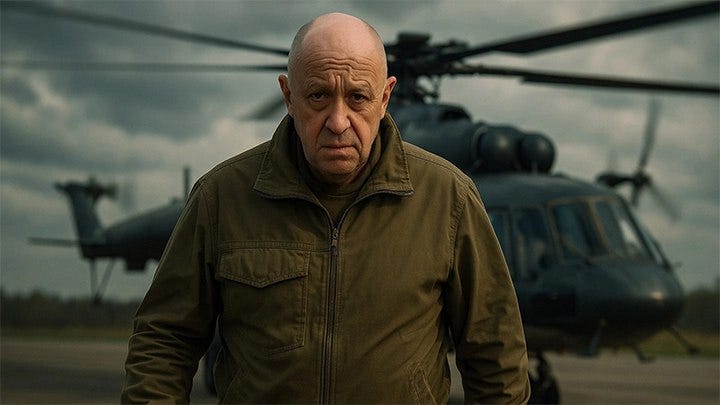
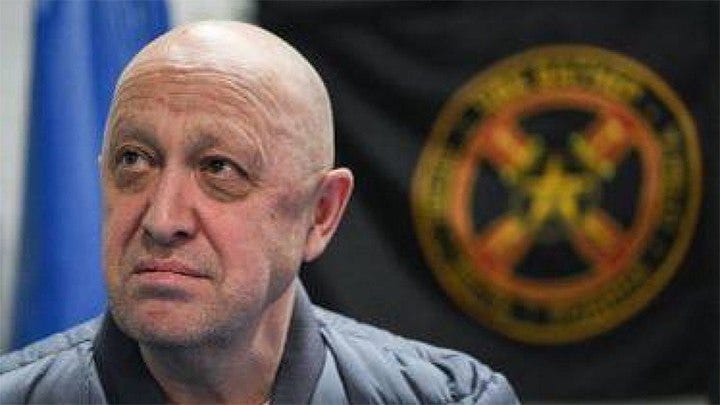
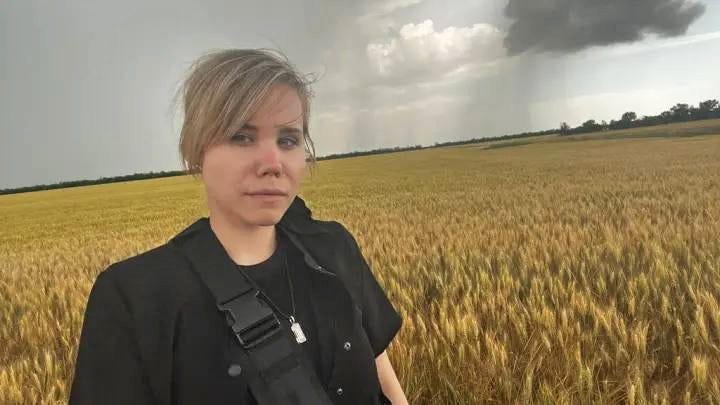
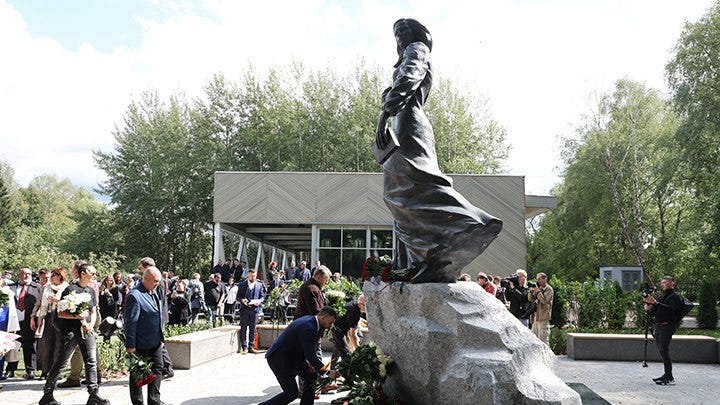
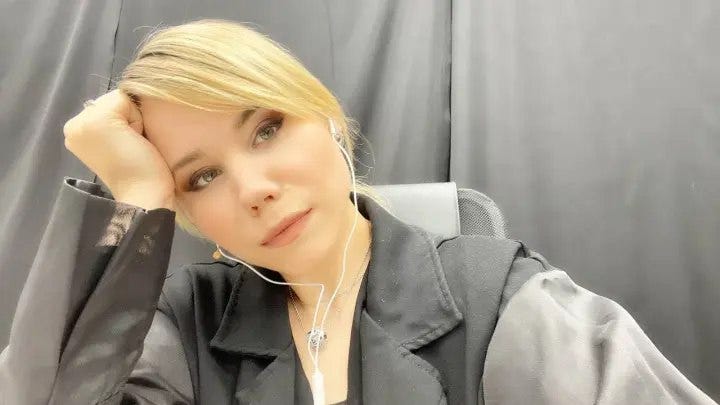
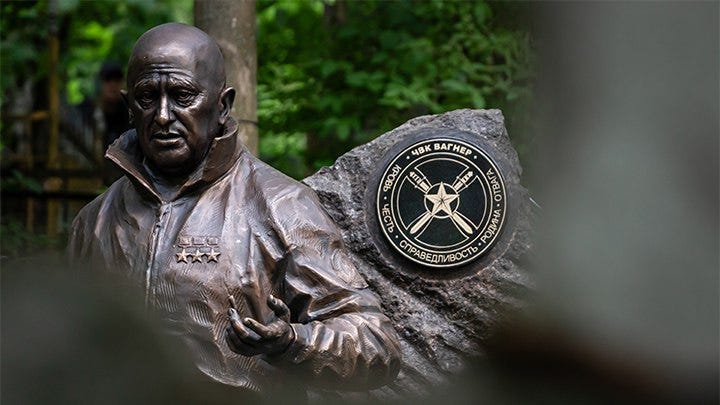

I am so sorry for your (temporary) loss of the brave, brilliant & beautiful Daria. But she is in good hands now. I once believed that death was The End. Now I understand that it is merely a transition where the husk of the seed falls away so that the plant can spring forth.
Your argument, which I understand to be that we don't know (when they are alive) who the heroes are because, while living, they may turn and become evil; is interesting. Is that a tenant of the Russian Orthodox Faith?
It is alien to Protestant Christian theology - and doesn't seem to me to be right. We are all sinners; but those who are saved would NEVER sell out to evil. And I know YOU wouldn't either. You & I might both eat a 2nd bowl of ice cream & more cookies when we shouldn't; but we'd die rather than get in involved in trafficking children; trafficking drugs, betraying innocents, etc.
Great story...I would say Prigozhin was the Patton of Russia